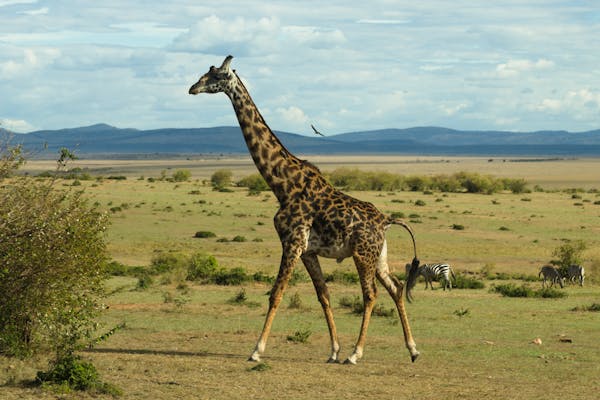Is It Safe to Go on Safari in Kenya Now? A Comprehensive Guide for Tourists
Kenya, renowned for its breathtaking landscapes and diverse wildlife, has long been a dream destination for safari enthusiasts from around the globe. However, like any travel destination, safety concerns can arise, prompting potential visitors to question whether it’s safe to embark on a safari adventure in Kenya, especially in today’s ever-changing world. In this comprehensive guide, we’ll delve into the various aspects of safety related to visiting Kenya for a safari, addressing common queries and providing essential tips for a secure and enjoyable experience.

Is Kenya Safari Safe for Tourists?
One of the foremost concerns for travelers contemplating a safari in Kenya is safety. The good news is that, in general, Kenya is a safe destination for tourists, including those embarking on safari adventures. The country relies heavily on tourism, and both the government and local communities are invested in ensuring visitors’ safety and well-being.
Kenya’s popular safari destinations, such as Maasai Mara, Amboseli National Park, and Tsavo National Park, are well-established tourist hubs with robust security measures in place. Safari lodges and camps prioritize the safety of their guests, implementing stringent security protocols and employing trained guides who are knowledgeable about the local terrain and wildlife behavior.
However, it’s essential to exercise caution and adhere to safety guidelines provided by your tour operator or accommodation provider. While wildlife encounters are a highlight of any safari experience, it’s crucial to maintain a safe distance and respect the animals’ natural habitat to avoid potentially dangerous situations.
Is It Safe to Travel to Kenya at the Moment?
The safety of traveling to Kenya, like any destination, can be influenced by various factors, including current events, political stability, and public health concerns. As of the present moment, Kenya remains a popular tourist destination, with many travelers enjoying their safari experiences without encountering any safety issues.
Before planning your trip, it’s advisable to stay informed about any travel advisories issued by your country’s government or international organizations. While Kenya has made significant strides in enhancing security and infrastructure, it’s essential to exercise vigilance, especially in urban areas, and stay updated on local developments.
What Not to Wear on a Safari in Kenya?
While the allure of safari fashion might prompt visions of khaki attire and wide-brimmed hats, it’s essential to prioritize practicality and comfort over fashion trends when packing for your Kenyan adventure. Here are some tips on what not to wear on a safari in Kenya:
- Bright colors: Avoid wearing bright or fluorescent clothing that may attract unwanted attention from wildlife or disrupt the natural ambiance of the safari experience. Opt for neutral tones such as beige, khaki, or olive green, which blend seamlessly with the environment.
- Heavy fabrics: Lightweight, breathable fabrics are ideal for safari excursions, as they provide comfort in Kenya’s warm climate and allow for ease of movement during game drives and bush walks. Steer clear of heavy materials that may cause discomfort or restrict mobility.
- Open-toed shoes: While sandals may seem like a comfortable choice for warm weather, they offer minimal protection against thorny vegetation, insects, and potential hazards encountered in the bush. Instead, opt for closed-toe shoes or sturdy boots with good grip for safety and support.
- Excessive jewelry: Leave valuable or flashy jewelry at home to minimize the risk of theft or loss during your safari adventure. Simple accessories and a sun hat are sufficient for sun protection and style without drawing unnecessary attention.
By packing wisely and prioritizing practicality, you can ensure a comfortable and enjoyable safari experience in Kenya without compromising safety or style.
What Do I Need to Know Before Going on a Safari in Kenya?
Before embarking on your safari adventure in Kenya, it’s essential to familiarize yourself with some key aspects to ensure a smooth and memorable experience. Here’s what you need to know before going on a safari in Kenya:
- Entry requirements: Ensure that you have a valid passport with at least six months’ validity remaining and obtain any necessary visas or permits for entry into Kenya. Check the latest visa regulations and entry requirements well in advance to avoid any last-minute hassles.
- Health precautions: Kenya is a malaria-endemic country, so it’s advisable to take appropriate malaria prophylaxis and consult your healthcare provider regarding recommended vaccinations and health precautions before traveling. Pack a basic first-aid kit and adhere to food and water safety guidelines to minimize the risk of illness during your trip.
- Wildlife etiquette: Respect the wildlife and follow the instructions of your safari guide when encountering animals in their natural habitat. Keep noise to a minimum, avoid sudden movements, and never attempt to feed or approach wild animals. Maintain a safe distance and use binoculars or a zoom lens for close-up observations.
- Cultural sensitivity: Kenya is home to diverse ethnic groups, each with its own traditions, customs, and languages. Show respect for the local culture and customs by dressing modestly, asking for permission before taking photographs of people, and learning a few basic greetings in Swahili, the national language.
- Environmental conservation: Help preserve Kenya’s natural heritage by practicing responsible tourism and minimizing your environmental impact. Dispose of waste properly, avoid single-use plastics, and support eco-friendly lodges and tour operators committed to sustainable practices.
By arming yourself with essential knowledge and adhering to these guidelines, you can embark on a safari in Kenya with confidence, knowing that you’re well-prepared for a safe, enriching, and unforgettable experience.
Is It Safe to Go on Safari in Kenya Now from the USA?
For travelers from the USA considering a safari in Kenya, safety concerns may arise due to factors such as distance, unfamiliarity with the destination, and perceptions shaped by media coverage. However, it’s important to note that many Americans visit Kenya for safaris each year without encountering any major safety issues.
Before traveling, it’s advisable to research reputable tour operators, read reviews from past travelers, and seek advice from travel professionals specializing in African safaris. By choosing a trusted tour provider and exercising common sense precautions, such as staying informed about local conditions and following safety guidelines, Americans can enjoy a safe and rewarding safari experience in Kenya.
Is Kenya Safe for White Tourists?
Safety concerns based on race or ethnicity should not deter anyone from visiting Kenya, as the country is known for its warm hospitality and welcoming attitude towards tourists of all backgrounds. While instances of discrimination or prejudice may occur in any destination, they are not reflective of the majority of Kenyan people, who embrace diversity and value cultural exchange.
White tourists visiting Kenya can expect to be treated with respect and kindness by locals, who are often eager to share their rich heritage and traditions with visitors. By approaching interactions with an open mind and a spirit of mutual respect, travelers can forge meaningful connections and enjoy authentic cultural experiences in Kenya.
Is It Safe to Travel to Kenya Right Now?
As with any travel destination, the safety of visiting Kenya at any given time can be influenced by a range of factors, including current events, public health concerns, and regional stability. While Kenya has experienced periods of political unrest and security challenges in the past, the country has made significant strides in enhancing security measures and promoting tourism safety in recent years.
Before traveling to Kenya, it’s advisable to stay informed about any travel advisories or warnings issued by your government or international organizations. Additionally, consider factors such as the local COVID-19 situation, transportation infrastructure, and accessibility of medical services when planning your trip.
While it’s impossible to predict every potential risk or scenario, exercising caution, staying informed, and taking appropriate precautions can help ensure a safe and enjoyable travel experience in Kenya.
Countries Not Allowed to Travel to Kenya
As of the current date, Kenya has not imposed specific restrictions on travelers from any particular countries. However, entry requirements, visa regulations, and travel restrictions may vary depending on your country of origin and the prevailing circumstances, such as public health concerns or security threats.
Before planning your trip to Kenya, check the latest travel advisories and entry requirements issued by the Kenyan government and consult with relevant authorities or travel agencies for up-to-date information.
Is It Safe to Travel to Nairobi Right Now?
Nairobi, the capital city of Kenya, serves as a gateway to many safari destinations and offers a vibrant cultural scene, historical attractions, and bustling markets. While Nairobi has experienced security challenges in the past, the city has implemented various measures to enhance safety and security for residents and visitors alike.
As with any urban center, it’s essential to exercise caution and be aware of your surroundings when exploring Nairobi. Avoid displaying valuables openly, especially in crowded areas, and use reputable transportation options such as registered taxis or rideshare services.
Additionally, stay informed about any localized security concerns or developments that may affect your travel plans and follow the guidance of local authorities and your accommodation provider.
Is Nairobi, Kenya, Safe?
Nairobi, like any major city, has its share of safety concerns, including petty crime, traffic congestion, and occasional security incidents. However, millions of people live and work in Nairobi safely every day, and the city offers a wide range of attractions, dining options, and cultural experiences for visitors to enjoy.
To enhance your safety and peace of mind while in Nairobi, consider staying in well-established neighborhoods or accommodation facilities with security measures in place. Avoid walking alone at night, especially in unfamiliar areas, and remain vigilant against pickpocketing or other petty crimes in crowded spaces.
By exercising common sense precautions and staying informed about local conditions, you can explore Nairobi confidently and discover the diverse charms of Kenya’s vibrant capital city.
How Safe Is Nairobi Airport?
Jomo Kenyatta International Airport (JKIA) in Nairobi is the main gateway for international travelers arriving in Kenya. Like other major airports worldwide, JKIA prioritizes passenger safety and security through comprehensive screening procedures, surveillance systems, and trained security personnel.
While incidents of crime or security breaches at Nairobi Airport are rare, travelers should remain vigilant and keep an eye on their belongings at all times, especially in crowded areas such as terminals or baggage claim areas. Follow the instructions of airport staff and security personnel, and report any suspicious activity or concerns to the authorities immediately.
By adhering to security protocols and staying aware of your surroundings, you can navigate Nairobi Airport safely and efficiently as you embark on your safari adventure or onward travels in Kenya.
Bad Things About Kenya
While Kenya offers travelers a wealth of natural beauty, cultural diversity, and unforgettable experiences, like any destination, it’s not without its challenges and drawbacks. Some potential concerns for visitors to Kenya may include:
- Safety and security: While Kenya has made significant progress in enhancing security measures and reducing crime rates in recent years, travelers should remain vigilant, especially in urban areas, and take precautions to avoid becoming victims of theft or petty crime.
- Health risks: Malaria is endemic in many parts of Kenya, and travelers should take appropriate precautions, such as malaria prophylaxis and insect repellent, to minimize the risk of contracting the disease. Additionally, travelers should be aware of food and water safety practices to prevent gastrointestinal illnesses.
- Traffic congestion: Nairobi, in particular, is known for its notorious traffic congestion, which can result in delays and frustration for travelers navigating the city’s roadways. Plan your transportation accordingly and allow extra time for travel, especially during peak hours.
- Wildlife poaching: Illegal wildlife poaching remains a significant issue in Kenya, threatening the survival of iconic species such as elephants and rhinos. Visitors can support conservation efforts by avoiding products made from endangered wildlife and supporting responsible tourism operators committed to wildlife protection.
- Environmental challenges: Kenya faces environmental challenges such as deforestation, habitat destruction, and pollution, which can impact the country’s natural ecosystems and biodiversity. Travelers can contribute to conservation efforts by minimizing their environmental footprint and supporting sustainable tourism initiatives.
Despite these challenges, Kenya continues to captivate travelers with its natural wonders, cultural heritage, and warm hospitality. By staying informed, exercising caution, and supporting responsible tourism practices, visitors can enjoy a safe and enriching experience in this remarkable East African nation.
In conclusion, while safety concerns may arise when considering a safari adventure in Kenya, the country remains a popular and rewarding destination for travelers from around the world. By arming yourself with essential knowledge, prioritizing safety precautions, and embracing the spirit of adventure, you can embark on a safari in Kenya with confidence, knowing that you’re well-prepared for an unforgettable journey into the heart of Africa.


